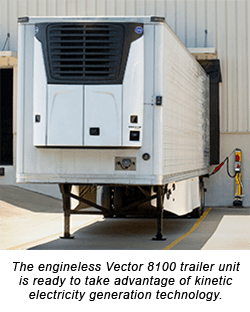

Power that Moves: In Pursuit of More Sustainable Ways to Deliver Refrigerated Goods
Imagine a future in which a trailer loaded with perishable cargo has the ability to refrigerate itself simply by the act of rolling down the highway.
Fulfillment of that vision is arriving sooner than you might think, thanks to Carrier Transicold innovation.
Literally a new generation technology, Carrier Transicold is developing a sustainable power source for trailer refrigeration that uses cutting-edge energy recovery and storage. It is a perfect complement to Carrier Transicold’s Vector™ trailer units, which uniquely feature electrically driven (E-Drive™) refrigeration systems that are perfectly suited to alternative energy sources.
From its inception, the Vector platform’s onboard electric power plant utilized a high-performance generator coupled to a diesel engine. In contrast, this new approach offers the potential to eliminate the engine and generator, producing “free” electricity without the added fuel consumption, emissions and engine noise typically associated with trailer refrigeration systems.
“Emissions-free, kinetic energy technology for trailer refrigeration is already proving itself in Europe, where it was recently introduced by Carrier Transicold as Vector eCool™ technology, the first fully autonomous engineless trailer refrigeration system,” said Dave Kiefer, Director of Marketing and Product Management, Carrier Transicold, North America Truck/Trailer. “The system converts kinetic energy generated by the trailer into electricity, which is then stored in a battery module and used to power the refrigeration unit as needed.”
Carrier Transicold spotlighted the concept along with its Vector 8100 engineless trailer refrigeration system at the Advanced Clean Transportation (ACT) Expo held recently in Long Beach, California.

For North American applications, where refrigerated trailers are larger than typical European trailers and often traverse hotter regions for longer periods of time, Carrier Transicold engineers are focused on upscaling the technology to accommodate the more powerful systems in the Vector 8000 series, which produce up to 60,000 BTU/h of cooling. Regenerative braking may be the solution, according to Kiefer.
“Applying the brakes to a tractor trailer produces a tremendous amount of energy,” Kiefer explained. “That energy can then be used to power a Carrier Vector unit to provide zero-emission refrigeration.”
Just as with current Vector units, those with kinetic energy technology will be able to be plugged into an AC power supply for precooling when the trailer is parked, and system batteries can be charged via the grid simultaneously.
The Vector platform, proven in applications worldwide, is known for its efficiency, quiet operation and reduced maintenance requirements because its electric architecture eliminates typical serviceable components such as belts, pulleys and compressor shaft seals found in conventional refrigeration systems.
“We are tremendously excited about the potential for Vector units equipped with alternative energy technology to help North American refrigerated fleets achieve sustainability goals, cut fuel consumption and emissions and achieve compliance in a changing regulatory climate,” Kiefer said.
While today’s commercial transportation industry is sharply focused on development of efficient, emissions-free, autonomous and electric technologies for mobility, Carrier Transicold’s Vector trailer refrigeration platform is ahead of the curve and readily adaptable to new energy sources for a more sustainable future.